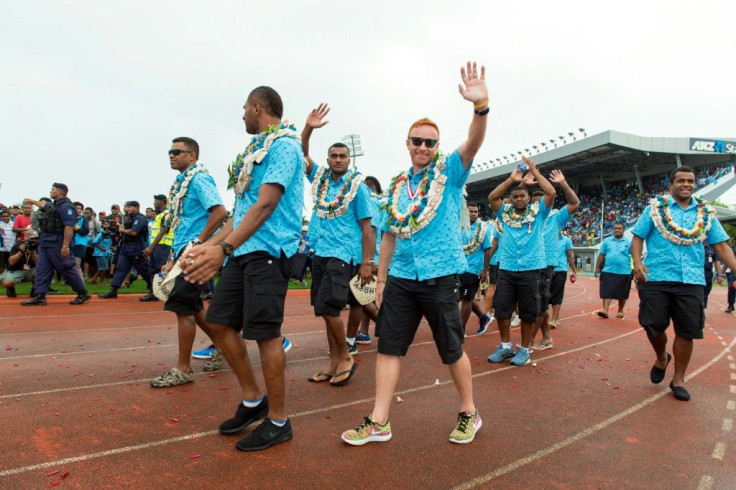Expectations High For Fiji, Spiritual Home Of Rugby Sevens
Towering hulks of Fijian rugby sevens players kneeling to receive their Olympic gold medals from Princess Anne was one of the most enduring images of the Rio Games.
Whether it was out of humble deference to the British royal or courtesy as she would have struggled to put the be-ribboned golds around the sweaty players' necks, a dais adding to their extra height, it was an extraordinary moment for Fiji.
The team, coached by Englishman Ben Ryan, had won a first ever Olympic medal, and gold at that, for the South Pacific nation, its population of 890,000 scattered over more than 330 islands.
It was fitting it came in rugby sevens, a sport synonymous with Fiji and the country's catalogue of off-loading, side-stepping players who, while perhaps not the complete fit for the 15-a-side game, are capable of lighting up any stadium in the abbreviated form.
Ryan, speaking in Rio after overseeing the team's 43-7 final victory over Britain, said his players had been bearing the weight of a nation.
"It is fair to say, Fiji is close to meltdown with Rio fever," he said. "It is always an obsession on the island to follow the team but it has gone to a new level with the Olympics.
"The people's team cannot shy away from that connection."
Ryan, made a chief and granted a parcel of land for his effort, said gold had seen the player "smash though glass ceilings".
"Growing up with very little, playing in a programme that was simple and without the bells and whistles of so many Olympic nations, they became pathfinders for those back in Fiji," Ryan said in a column for The Guardian newspaper this week.
As Ryan departed as coach, in came Welshman Gareth Baber, with Rio memories never far away.
"It's been mentioned to me every day for the last five years," he said. "The expectation is always that you go and front up, and win gold."
Ryan said that the Rio victory "gave a real-life example of not letting the past dictate your future. Someone from the same village, the same school, was now an Olympic champion".
Sevens, Baber added, "is a source of national pride. It's so linked with the culture of Fiji and the history and tradition of the game of sevens around the world".

The sport, which originated in Scotland back in 1883, "is played as differently by one team (Fiji) as any international sport I have seen", Baber said in a BBC interview.
"You can hark back to Brazilian football teams of the 1970s or the great Australian cricket teams of the 1990s. Fijian rugby is as different and special as that."
Baber lists a number of socio-economic and geographical reasons for Fiji's success in the sport, predicting it will not change for another 30-40 years.
Thanks to a dearth of after-school activities, 'village touch' rugby is a regular occurence.
"It could be 40-a-side, with makeshift posts made out of bamboo -- I am not saying that in a romantic sense, that is exactly what you see," he said.
Instrumental in victory in Rio, and again present in Tokyo, key playmaker Jerry Tuwai grew up in a village with no electricity or roads. He and his childhood friends used to improvise a rugby ball from a coconut, plastic water bottle or even a scrunched-up t-shirt.
"The game is the same all over the islands -- high risk, high tempo, offloading, no real consequences for the ball going to ground," Baber continued.
"You develop your skills differently in that environment, learning and creating in an unstructured way, compared to being on a grass pitch with coaches either end telling you what to do."
Baber said that Fijians were also used to hard work from a young age, working farmland, walking often long distances to school and doing chores when back at home.
"There are eight or nine-year-olds here in Fiji with the physique of a 17 or 18-year-old in a rugby academy in Britain," the former scrum-half said.
Fijians are prominent in professional rugby union across the globe, their remittances proving a significant boon in local economies.
Every week, several hundred turn out in Super Rugby, top leagues in Australia, New Zealand and Japan, as well as throughout many of the 55 professional union teams in Europe.
But all eyes will be on the true sevens experts in Tokyo next week. "I would be lying if I said I hadn't envisaged us winning it," said Baber.
© Copyright AFP 2024. All rights reserved.







